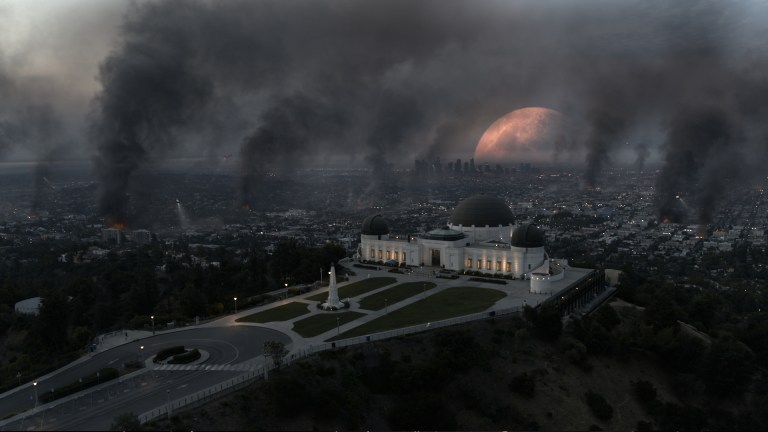Could Moonfall Really Happen?
We check in with a real-life disaster researcher to see if Roland Emmerich’s new movie Moonfall is backed up by real science.

With many of his past films, director Roland Emmerich has specialized in portraying the most extreme kinds of mass destruction events possible, whether it’s climate change on a colossal scale, the shifting of tectonic plates worldwide or a massive army of alien invaders filling the skies. In his new movie, Moonfall, Emmerich kind of combines all those threads (after a fashion) in a tale of what might happen if the Moon suddenly begins plunging toward Earth due to mysterious, possibly intelligent forces.
Of course, one’s first reaction is to scoff: surely there is no chance of the Moon being untethered from its orbit and dropping onto the Earth, by either natural or artificial means. But that’s where Mika McKinnon comes in. A geophysicist and disaster researcher who has been providing science consultation for over a decade, she was one of a team of science advisers on Moonfall, specializing in giving even the most seemingly outlandish propositions a sturdy underpinning in real-life science.
“That’s an engineering problem,” she says when asked if the Moon could actually be dislodged and sent rolling like a billiard ball into its mother planet. “The physics checks out. It’s just engineering, whether or not you could actually pull off moving it. As for naturally doing it, there are circumstances under which you could move the orbit of the Moon to be closer. But that would be quite extraordinary to do.”
McKinnon explains that the Moon is actually moving farther away from the Earth, as part of the delicate gravitational dance that the two bodies do (with the participation of the Sun, as well). But she adds that her job as a science consultant is not to inform the filmmakers that their story can’t be told, but rather to give them at least a plausible context for the scenario they’re developing.
“One of the really fun things about science consulting is that it’s often a question of what do you need for the storyline and I will find a way to make it happen,” she says. “So what is the situation that is required? Let’s figure out the plausibility behind that, here is your science to support the story you’re going to tell anyway.”
McKinnon continues that she and the other science advisers on Moonfall used real scientific models to map out just what things on Earth might look like if the Moon began skimming closer to the surface.
“As the moon gets closer, its orbit is going to go faster and faster and faster, just like if you’re putting your arms in or out when spinning around in an office chair — you’re going to go slower or faster,” she says. “So we did model that out. We also talked about things like objects having a Roche limit, a point where their gravity is strong enough to start shredding objects…(So the Earth) would shred the moon.”
As for whether humanity — or least some representatives of it, such as those played in the movie by Halle Berry (Bruised), Patrick Wilson (Aquaman and the Lost Kingdom) and John Bradley (Game of Thrones) — could mobilize their resources to stave off the catastrophic collision of the Moon and Earth, even McKinnon’s skills at modeling and predicting large-scale disasters are not enough to definitively answer that question.
“We are not easily motivated into collective action in a lot of ways,” she says. “We talk about this in disaster science — that we survive together or die alone, that we need to work together in order to survive. You need to be able to have the efforts of more than just one person or one small group in order to have that resiliency and the adaptability and the ability to rebuild. It is challenging to see us taking collective action when we’re seeing worsening climate disasters, and when we’re two years into a pandemic where we’re still running into issues with collective action and policy decisions and access to vaccines and all of that. So it’s really challenging to see us come together on this.”
In other words, while the events of Moonfall might be far-fetched on their own, the idea of humanity coming together to save itself might be the real leap of imagination.
Moonfall opens in theaters this Friday (February 4).
